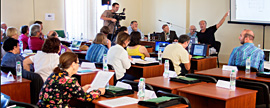This year the International Research Center for Traditional Polyphony begins publication of the materials preserved at the Georgian Folk Music Department under the series From the Archive of the Georgian Folk Music Laboratory. The first compact disk of the series includes material from the field expeditions organized in Kakheti in 1952. This was one of the first scientific expeditions from Tbilisi State Conservatoire, which was led by Grigol Chkhikvadze in Gurjaani, Telavi and Qvareli districts. It goes without saying, that after 53 years much data had to be recovered, such as the names of performers, their personal data, photos, etc. This was the aim of our visit to Kakheti last October.
In the first place we had to find the descendants of the singers. In the village of Velistsikhe we visited Tamar Ghviniashvili-Gabruashvili, Giga Ghviniashvili’s daughter. She provided us with the information on her father, her sisters who were singers too, and her cousin Grisha Rikiashvili, who was a permanent member of their family ensemble. It turned out that Rikiashvili, too, participated in the recording of 1952, but there was no information about this in our data.
81-year-old Shukuri Gurgenishvili is the only person alive out of those who were recorded in Velistsikhe in 1952. Due to his ill health we couldn’t meet him. Instead we visited his brother Shinagi Gurgenishvili, who still has his brother’s panduri; this is the very instrument that Shukuri played as the accompaniment to his song Garet Tsiva Kris Kari fifty-four years ago. Shinagi also told us about his father Ia Gurgenishvili, who had been a leader of Velistsikhe choir for years.
In Gurjaani we met elderly singers – 81-year-old Giorgi Gogolashvili, one of the few surviving singers of Levan Mughalashvili’s choir, and 80-year-old Vakhtang Kachlishvili. Together with very interesting conversation, we recorded some of their songs too. We recommend a return visit to record these people in the future. Giorgi Gogolashvili helped us find Levan Mughalashvili’s grave. At Gurjaani Regional Museum we got familiarized with Mughalashvili’s personal archive and took about 158 photos of important documents. We also obtained 46 photos from family albums.
In the village of Artana our host was a renowned song-master Andro Simashvili, son of Giorgi Simashvili (you can find the interesting interview with him in our Bulletin’s section “Georgian Song-masters”).
In order to specify the information on Qvarely choir we had to knock on many doors. Among the people we met were Pelagia Papuashvili, Dodo Gelashvili, Ilia and Robinson Gubeladze, Suliko Matiashvili, Zaur Ghviniashvili, Sopiko Nasqidashvili from the village of Eniseli and many others. There are many others to whom we are indebted for their valuable help.
It should be said that the aim of the expedition – obtaining more specific information who had died long before – turned out to be harder than we expected. Making inquires often gave no results; half-a-century’s time has left a heavy trace on both life and peoples’ memory . . . Despite many attempts, we failed to get Solomon Chachauri’s photo or any information on Partena Arjevnishvili; the name of the singer from the village of Kardenakhi who sang Urmuli remains unknown. Nevertheless, we believe our expedition was successful; the recorded material amounts to 5 minidisks (about 9 hours in length) and about 500 photos.
For their assistance we are indebted to all those who gave us help; these are Tinatin Zardiashvili – Head of Gurjaani Department of Culture, Natela Razmadze – head of funds at Gurjaani Regional Museum, Nino Mindorashvili – secretary of Velistsikhe village council, Levan Abashidze- director of the Ensemble Tsinandali, Marina Aladashvili- chanter of Ghvtaeba church, Maia Mamulashvili – from Qvareli House of Culture, Asmat Qipshidze – music school teacher, the State Center of Georgian Folklore, Shota Rustaveli Institute of Georgian Literature of the Georgian Academy of Sciences.
If the issuance of expedition materials continues and turns into serial publication, we believe the information database of Georgian folk music will be supplemented with valuable examples.




